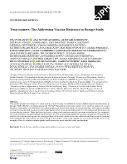| dc.contributor.author | Vuolanto, Pia | |
| dc.contributor.author | Almeida, Ana Nunes | |
| dc.contributor.author | Anderson, Alistair | |
| dc.contributor.author | Auvinen, Petra | |
| dc.contributor.author | Beja, Andre | |
| dc.contributor.author | Bracke, Piet | |
| dc.contributor.author | Cardano, Mario | |
| dc.contributor.author | Ceuterick, Melissa | |
| dc.contributor.author | Correia, Tiago | |
| dc.contributor.author | De Vito, Elisabetta | |
| dc.contributor.author | Delaruelle, Katrijn | |
| dc.contributor.author | Delicado, Ana | |
| dc.contributor.author | Esposito, Maurizio | |
| dc.contributor.author | Ferrara, Maria | |
| dc.contributor.author | Gariglio, Luigi | |
| dc.contributor.author | Guerreiro, Catia | |
| dc.contributor.author | Hasmanová Marhánková, Jaroslava | |
| dc.contributor.author | Hilario, Ana Patricia | |
| dc.contributor.author | Hobson-west, Pru | |
| dc.contributor.author | Iorio, Juliana | |
| dc.contributor.author | Järvinen, Katri-Maria | |
| dc.contributor.author | Koivu, Annariina | |
| dc.contributor.author | Kotherová, Zuzana | |
| dc.contributor.author | Kuusipalo, Aapo | |
| dc.contributor.author | Lermytte, Esther | |
| dc.contributor.author | Mendonca, Joana | |
| dc.contributor.author | Morais, Rita | |
| dc.contributor.author | Numerato, Dino | |
| dc.contributor.author | Polak, Paulina | |
| dc.contributor.author | Rudek, Tadeusz | |
| dc.contributor.author | Sbaragli, Sara | |
| dc.contributor.author | Scavarda, Alice | |
| dc.contributor.author | Silva, Katielle | |
| dc.contributor.author | Da Silva, Pedro Alcantara | |
| dc.contributor.author | Sivela, Jonas | |
| dc.contributor.author | Soares Moura, Eva | |
| dc.contributor.author | Swiatkiewicz-Mosny, Maria | |
| dc.contributor.author | Tipaldo, Giuseppe | |
| dc.contributor.author | Wagner, Aleksandra | |
| dc.date.accessioned | 2024-07-31T16:46:06Z | |
| dc.date.available | 2024-07-31T16:46:06Z | |
| dc.date.issued | 2024 | |
| dc.identifier.uri | https://hdl.handle.net/20.500.14178/2564 | |
| dc.description.abstract | This article presents the design of a seven-country study focusing on childhood vaccines, Addressing Vaccine Hesitancy in Europe (VAX-TRUST), developed during the COVID-19 pandemic. The study consists of (a) situation analysis of vaccine hesitancy (examination of individual, socio-demographic and macro-level factors of vaccine hesitancy and analysis of media coverage on vaccines and vaccination and (b) participant observation and in-depth interviews of healthcare professionals and vaccine-hesitant parents. These analyses were used to design interventions aimed at increasing awareness on the complexity of vaccine hesitancy among healthcare professionals involved in discussing childhood vaccines with parents. We present the selection of countries and regions, the conceptual basis of the study, details of the data collection and the process of designing and evaluating the interventions, as well as the potential impact of the study. Laying out our research design serves as an example of how to translate complex public health issues into social scientific study and methods. | en |
| dc.language.iso | en | |
| dc.relation.url | https://doi.org/10.1177/14034948231223791 | |
| dc.rights | Creative Commons Uveďte původ 4.0 International | cs |
| dc.rights | Creative Commons Attribution 4.0 International | en |
| dc.title | Trust matters: The Addressing Vaccine Hesitancy in Europe Study | en |
| dcterms.accessRights | openAccess | |
| dcterms.license | https://creativecommons.org/licenses/by/4.0/legalcode | |
| dc.date.updated | 2025-03-17T14:41:34Z | |
| dc.subject.keyword | Vaccine hesitancy | en |
| dc.subject.keyword | health sociology | en |
| dc.subject.keyword | public health | en |
| dc.subject.keyword | cross-country study | en |
| dc.subject.keyword | study design | en |
| dc.subject.keyword | | en |
| dc.identifier.eissn | 1651-1905 | |
| dc.relation.fundingReference | info:eu-repo/grantAgreement/EU/FP9/965280 | |
| dc.date.embargoStartDate | 2025-03-17 | |
| dc.type.obd | 73 | |
| dc.type.version | info:eu-repo/semantics/publishedVersion | |
| dc.identifier.doi | 10.1177/14034948231223791 | |
| dc.identifier.utWos | 001162834200001 | |
| dc.identifier.eidScopus | 2-s2.0-85185667989 | |
| dc.identifier.obd | 648956 | |
| dc.identifier.pubmed | 38346923 | |
| dc.subject.rivPrimary | 50000::50400::50401 | |
| dcterms.isPartOf.name | Scandinavian Journal of Public Health | |
| dcterms.isPartOf.issn | 1403-4948 | |
| dcterms.isPartOf.journalYear | 2024 | |
| dcterms.isPartOf.journalVolume | 52 | |
| dcterms.isPartOf.journalIssue | 3 | |
| uk.faculty.primaryId | 118 | |
| uk.faculty.primaryName | Fakulta sociálních věd | cs |
| uk.faculty.primaryName | Faculty of Social Sciences | en |
| uk.department.primaryId | 345 | |
| uk.department.primaryName | Katedra sociologie | cs |
| uk.department.primaryName | Department of Sociology | en |
| uk.department.secondaryId | 346 | |
| uk.department.secondaryName | Katedra veřejné a sociální politiky | cs |
| uk.department.secondaryName | Department of Public and Social Policy | en |
| dc.description.pageRange | 379-390 | |
| dc.type.obdHierarchyCs | ČLÁNEK V ČASOPISU::článek v časopisu::původní článek | cs |
| dc.type.obdHierarchyEn | JOURNAL ARTICLE::journal article::original article | en |
| dc.type.obdHierarchyCode | 73::152::206 | en |
| uk.displayTitle | Trust matters: The Addressing Vaccine Hesitancy in Europe Study | en |

